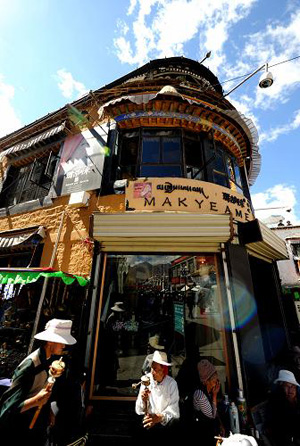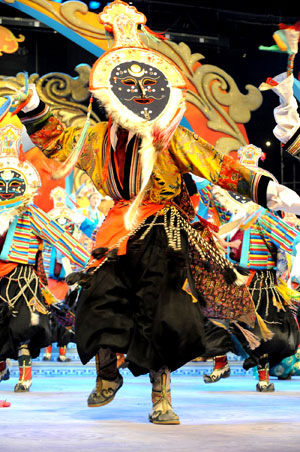Top 8 places for leisure and fun in Lhasa
5. Nightclubs in Lhasa
 |
|
Undated photo shows the well-known bar Makyeame on the Barkhor Street in Lhasa, capital of southwest China's Tibet Autonomous Region. [Xinhua Photo] |
The nightlife in Lhasa is no longer monotonous. Tourists with packs gather in pubs on Barkhor Street, while tourists organized by tourist groups are granted more choice. In an oxygen-rich theater, they can opt to watch acrobatics performances, situational dances or the performances of almost all folk customs in Tibet.
The Himalayas and the Happiness on the Road (two famous bars in Lhasa) feature the typical folk customs in almost all regions of Tibet so as to attract tourists with the performances most typical of Tibet.
"Rongzhongerjia," "Tanggulafeng" and "Meigao Club" are three fully-localized entertainment places. The first two are large-scale Langma halls that offer performances and entertainment and also serve as pubs, while the third is a pub that gives performances. Pubs on Barkhor Street are similar to that in Nanluoguxiang in Beijing, and the nightclubs, pubs and KTVs on South Deji Road are on a par with the ones in Shanghai's Xintiandi and Beijing Workers' Stadium West Road.
6. Go and listen to Tibetan Opera
|
|
|
Actors perform Tibetan opera during a dress rehearsal of the evening party held by Lhasa TV station for the upcoming new year of Tibetan calendar which falls on Feb. 25, in Lhasa, capital of southwest China's Tibet Autonomous Region, Feb. 10, 2009. [Xinhua Photo] |
The performance hall on the first floor of Himalayas Hotel is the only museum of Tibetan Opera left. The hotel, however, is locked and is not available for visitors most of the time, except when irregular performances are given there. When the Shoton Festival and Ongkor Festival are held, the opera troupe will be busy because they will perform in Norbulingka and several counties near Lhasa. Troupe leader Bianbasilun and actors in the opera troupe visit all the counties, and many people in these villages can hardly wait to watch the "Shoba Lhamo" performances, just like people in the mainland countryside waited for opera troupes eagerly in the past.
 0
0 








